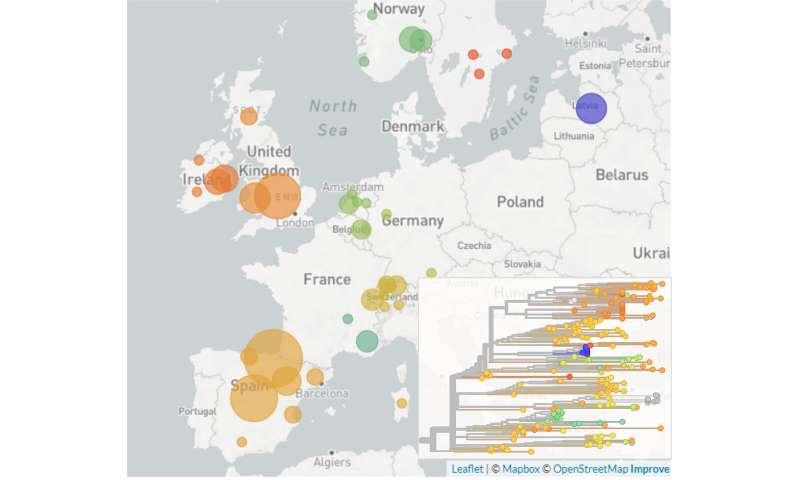Spain, Anxious to Invite the Holiday Crowd to Return Unleashed a Viral Storm
 |
| Spread of a SARS-CoV-2 variant across Europe, summer 2020 |
"From the spread of 20A.EU1, it seems clear that the measures in place were often not sufficient to stop onward transmission of introduced variants this summer.""[There was] no evidence that the variant's spread is due to a mutation that increases transmission or impacts clinical outcomes.""I've not seen any variant with this sort of dynamic for as long as I've been looking at genomic sequences of coronavirus in Europe."Emma Hodcroft, evolutionary geneticist, University of Basel, Switzerland
"We need more studies like this to find mutations that have risen to high frequency in the population, and then reverse-engineer them to see whether they make the virus more transmissible."Joseph Fauver, genetic epidemiologist, Yale University"We can see the virus has been introduced multiple times in several countries and many of these introductions have gone on to spread through the population."Taqnja Stadler, professor of computational evolution, ETH Zurich
| Research suggests that people returning from holiday in Spain played a key role in transmitting the virus across Europe © Andy Rain/EPA-EFE/Shutterstock |
The SARS-CoV-2 virus continues its seemingly endless trajectory, moving at speed throughout the globe, mutating constantly, throwing up new clues and forcing old ones to be abandoned, as the medical-scientific community around the world grapples with the conundrum that it presents, unlike any previous coronavirus in its intensity, infectiousness and deathly consequences for many. As much as has been discerned to the present, it is increasingly obvious that much, much more needs to be revealed and understood before science and medicine can gain a modicum of confidence it will in time tame the epidemic.
The latest revelation that has been unveiled is that a coronavirus variant originating in Spanish farm workers spread with rapidity over much of Europe since the summer months, now accounting for the majority of all new COVID-19 cases in a number of countries -- and in the United Kingdom, accounting for over 80 percent of new infections. The spread has been seen as nothing less than extraordinary by an international team of scientists tracking the virus through the genetic mutations it has undergone. The variant, named 20A.EU1 is described in a research paper on the cusp of publication.
It would appear from the team's investigative work that people returning after holidaying in Spain have played a fundamental role in the transmission of the virus across Europe. Stirring the question whether the second wave now sweeping the continent might have been diminished through improved screening techniques at airports and allied transportation hubs. There is little doubt that Spain hosted the current mutated strain, since each variant is identified by its own genetic signature, enabling tracing to the place where it originated.
Scientific teams in Switzerland and Spain now rush to examine the variant's behaviour in hopes of establishing whether it may be more deadly or more infectious than other strains. Dr.Hodcroft, lead author of the study, emphasized that 20A.EU1 is unlike any version of the SARS-CoV-2 virus causing COVID-19 she has heretofore encountered. Her team has been collaborating with virology laboratories to establish whether 20A.EU1 carries a certain mutation in the "spike protein" the virus makes use of to enable entry into human cells.
Mutations eventuate from all viruses, developing changes in individual letters of their genetic code which can group into new variants and strains. SARS-CoV-2 has another mutation named D614G which has been identified and is believed to make the virus more infectious. The new variant with its six distinctive genetic mutations emerged among agricultural workers in northeast Spain in June and swiftly moved through the local population, according to the study.
"One variant, aided by an initial super-spreading event, can quickly become prevalent", Inaki Comas, head of the SeqCOVID-Spain consortium studying the virus, noted. "Risky behaviour" of holiday-makers in Spain, ignoring social-distancing guidelines, who "continue to engage in such behaviour at home" aided the spread of the new variant, the researchers concluded. The new variant accounted for over eight out of ten cases in the U.K., 80 percent of cases in Spain, 60 percent in Ireland, and up to 40 percent in Switzerland and France.
|
Europa Press News/Europa Press via Getty Images
|
Labels: Mutations, SARS-CoV-2, Spain Infection, Study, Variants


0 Comments:
Post a Comment
<< Home